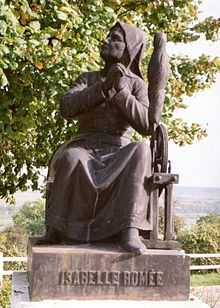Isabelle Romée

Isabelle Romée, also known as Isabelle de Vouthon and Isabelle d'Arc (1377–1458) and Ysabeau Romee, was the mother of Joan of Arc. A native of Vouthon-Bas where she married Jacques d'Arc and farmed about 50 acres (200,000 m2) of land. The family was ennobled by royal grant in December 1429. She moved to Orléans in 1440 after and received a pension from the city. She petitioned Pope Nicholas V to reopen the court case that had convicted Joan of heresy, and then, in her seventies, addressed the assembly delegation from the Holy See in Paris. The appeals court overturned the conviction of Joan on 7 July 1456.
Biography
Isabelle Romée was a native of Vouthon-Bas, a village near Domrémy where she and her husband Jacques d'Arc settled. Together they owned about 50 acres (200,000 m2) of land and a modest house. Isabelle Romée may have earned her surname from a pilgrimage to Rome. Surnames were not universal in the early 15th century and a woman could maintain a different one from her husband's.

Isabelle Romée gave her daughter a religious, Catholic upbringing and taught her the craft of spinning wool. She also had three sons: Jacquemin, Jean, and Pierre. She also had another daughter Catherine, though little to nothing is known about her life. Like the rest of the immediate family, she was ennobled by royal grant in December 1429. She moved to Orléans in 1440 after her husband's death and received a pension from the city.
Isabelle Romée spent the rest of her life restoring her daughter's name. She petitioned Pope Nicholas V to reopen the court case that had convicted Joan of heresy. An inquiry finally opened in 1449. On 7 November 1455, after the reign of Pope Callixtus III had begun, she traveled to Paris to visit the delegation from the Holy See. Although she was over seventy years old she addressed the assembly with a moving speech. It began, "I had a daughter, born in legitimate marriage, whom I fortified worthily with the sacraments of baptism and confirmation and raised in the fear of God and respect for the tradition of the Church," and ended, "…without any aid given to her innocence in a perfidious, violent, and iniquitous trial, without a shadow of right… they condemned her in a damnable and criminal fashion and made her die most cruelly by fire." The appeals court overturned the conviction on 7 July 1456.
Portrayals
- Selena Royle in the 1948 film Joan of Arc starring Ingrid Bergman.
- Jacqueline Bisset in the 1999 television miniseries Joan of Arc starring Leelee Sobieski.
Notes
- ^ As inscribed on a memorial plaque in Notre-Dame Cathedral dated April 22, 1894.
- ^ Pernoud and Clin, p. 221.
- ^ Pernoud and Clin, p. 147.
- ^ Pernoud and Clin, pp. 156–157.
See also
- Joan of Arc bibliography
External links
- Isabelle Romee page at MaidofHeaven
- Joan of Arc research collection founded in 1997. Displayed for educational purposes